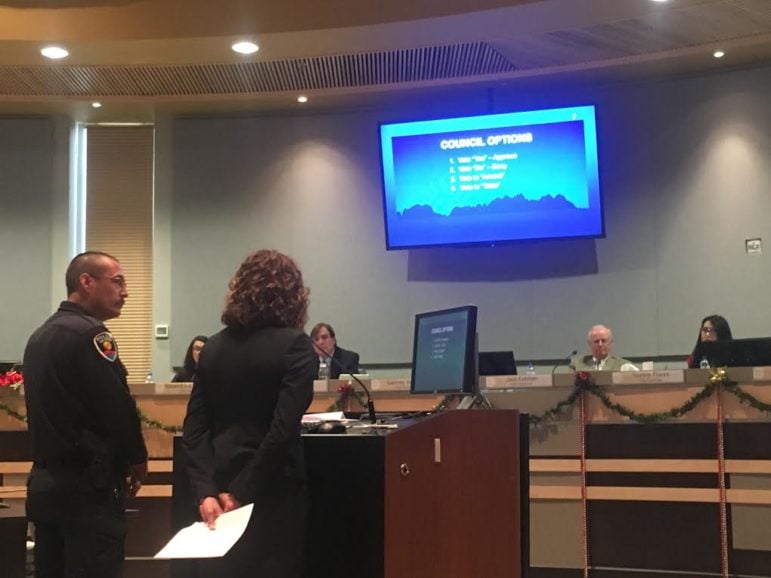
Police Chief Jaime Montoya and City Attorney Jennifer Vega-Brown present the resolution to the Las Cruces City Council. Photo by Xchelzin Peña.
Las Cruces city councilors unanimously voted Monday to affirm the city’s policy prohibiting police from questioning people about their immigration status unless doing so is necessary in a criminal investigation.
A resolution, presented by Police Chief Jaime Montoya and City Attorney Jennifer Vega-Brown, affirmed the city’s current Human Rights ordinance as well as several existing policies of the police department which prohibit law enforcement officers from asking people to show proof of citizenship when responding to a domestic dispute, a traffic violation or other types of interactions with the public.
Before voting for the resolution, city councilors focused their questions on policing and enforcement of federal immigration law.
“We enforce criminal law, we do not enforce administrative law, which is immigration law,” Montoya explained to Councilor Gabriel Vasquez.
Councilor Yvonne Flores questioned Montoya about procedures during routine traffic stops, particularly related to warrants for deportation violations, which she noted are federal felonies.
During standard traffic stops, police check driver’s license numbers, Montoya explained, to make sure the person has a valid license, and also run their name and date of birth to see if they have outstanding warrants.
“We don’t enforce the immigration status warrants, we just do the criminal warrants, the municipal, state and federal stuff,” Montoya said. “If it’s not a criminal warrant, we don’t enforce those.”
Montoya also said that Las Cruces police don’t cooperate with Border Patrol officers when they ask for assistance in immigration operations.
“We had a recent request… to do surveillance on someone they were looking for under a deportation order,” Montoya said. “We advised them we would not do that.”
Currently, the city has federal funding to cooperate with federal authorities on criminal investigations. Montoya said the agreement outlines that Las Cruces police will do “no type of immigration enforcement,” as a condition of the funding.
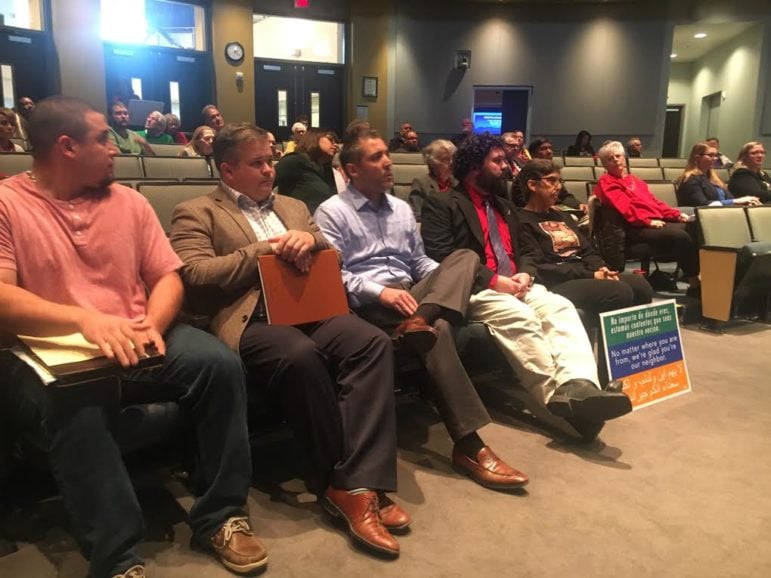
Immigrant advocates wait to speak before the city council. Photo by Xchelzin Peña.
About a dozen people in the audience spoke in favor of the proposal, including Rep. Bill McCamley (D-Mesilla Park) and Rep. Nathan Small (D-Las Cruces).
“I would like to thank all of you for this wonderful resolution.” said Las Cruces resident Jerry Nachison. “I have great grandnephews in El Paso who are Dreamers.”
But not everyone approved.
“The real heart of this matter is, that we have gone from sanctuary city to welcoming community, a change of name to protect the guilty I assume. This city is washed with drugs. I wonder where they come from? Gee…,” said Linda Dowless, a local resident of 14 years, eliciting a response from one city councilor.
Councilor Flores considers herself a “.5 generation” she said. Her father is from Chihuahua, Mexico and her mom is from San Geronimo, New Mexico, she said, with her father being brought to the U.S. undocumented and going on to serve in World War II and being a leader in his community.
“I just would like to let people know, like the woman who spoke earlier who was so angry about who brings the drugs…that we are a nation of immigrants and unless you can do your DNA to show that you are 100 percent Native American, then we are all immigrants,” Flores said.
Local groups advocated for city leaders to take action
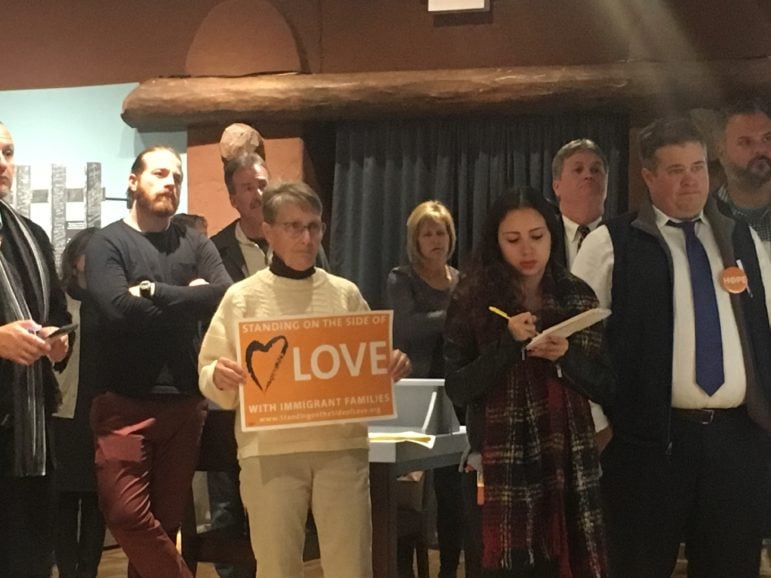
Jan Thompson, Las Cruces resident, holds a sign at the public event in support of the resolution. Photo by Xchelzin Peña.
Before the city council meeting, five Las Cruces organizations came together Thursday for a public event at the Branigan Cultural Center to explain why the resolution is necessary.
The organizations who attended were the ACLU Regional Center, Communidades en Acción y de Fe (CAFe), Hope Border Institute, Catholic Charities of Southern New Mexico and the Trotando Pasos Ajenos: Social Justice and Inequalities in the Borderlands Exhibit. They were joined by Police Chief Montoya.
Kenneth Ferrone, executive director of Catholic Charities of Southern New Mexico, said that about a year ago, he and other community members expressed concerns over government policy shifts regarding immigration.
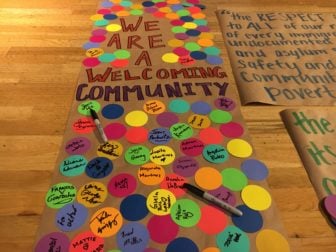
Signatures of community members fill up a sign in support of the resolution. Photo by Xchelzin Peña.
“This is a unique community where we have multiple cultures coming together, we’ve lived in unity for many years, and some of the things that are being talked about was not the narrative we knew,” Ferrone said. “So we felt it was important to come together to put together a resolution that affirms Las Cruces as a welcoming community.”
Lupita Martinez, who is currently in the federal Deferred Action for Childhood Arrivals (DACA) program, which allows her to temporarily stay in the United States, voiced her support.
“I am supporting this because I have friends and family that are undocumented,” said the 22 year old who was born in Juarez, Mexico and came to the U.S. when she was 11. “And I know Trump is doing these things to pull families apart and I don’t want my city to be a part of that.”
Catholic Charities has expressed that this resolution is important especially for DACA recipients.
“We were concerned even before the new administration came in, but with the new administration, some of the rhetoric we heard we were very worried particularly with the DACAs,” Ferrone said. “We work closely with them and help them with their application process and we stand ready and committed in helping them to avoid deportation when their eligibility expires.”
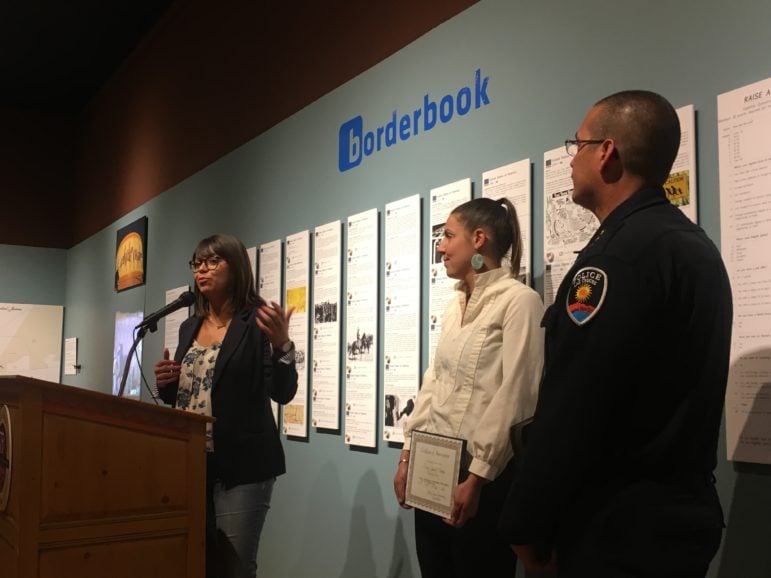
Johana Bencomo of NM CAFe speaks at the public event in support of the resolution. Photo by Xchelzin Peña.
Nicholas Natividad, New Mexico State University criminal justice professor, lauded Montoya, the police chief, for establishing a culture within the Las Cruces police department of working with the community.
“The resolution is important to understand the legacy of the tenure of Chief Montoya and the police department, how he set up partnership with the community and has used best practices like community policing,” Natividad said.
According to Montoya, who is retiring Saturday, the resolution affirms current policies within the police department.
“I remember I talked to Lupita about a month ago and she brought up her story on how she was afraid on what is going to happen to her family and as a Dreamer. And at that time, I told her a story also, because I think many of you here have personal stories. And what I have told her was a personal story from my side of the family, where I have a family member who is undocumented.” Montoya said. “We all are affected by what is going around our nation.”